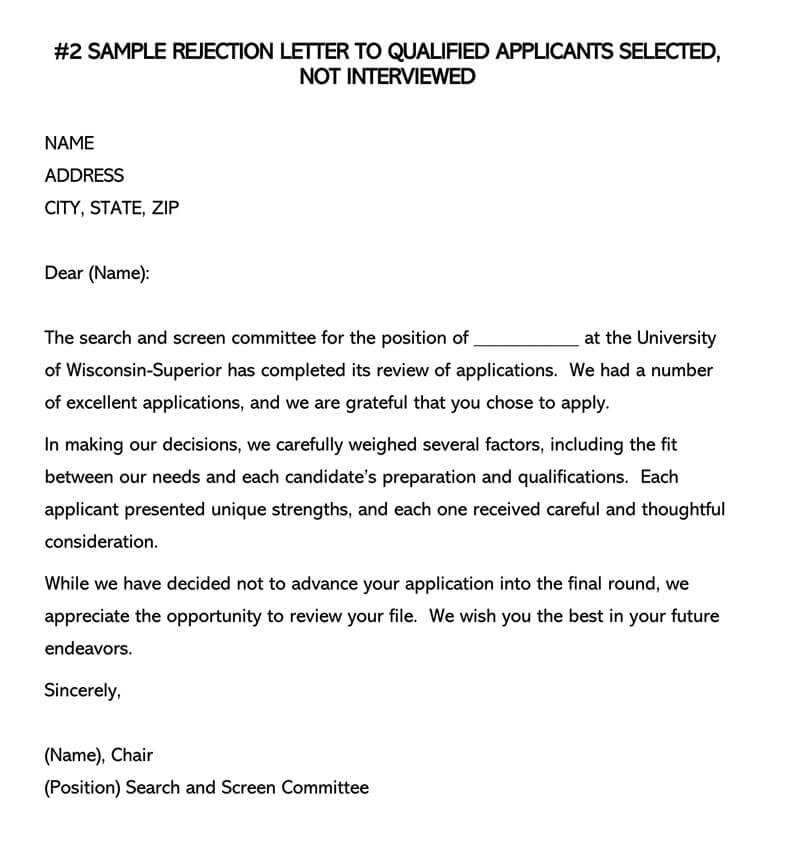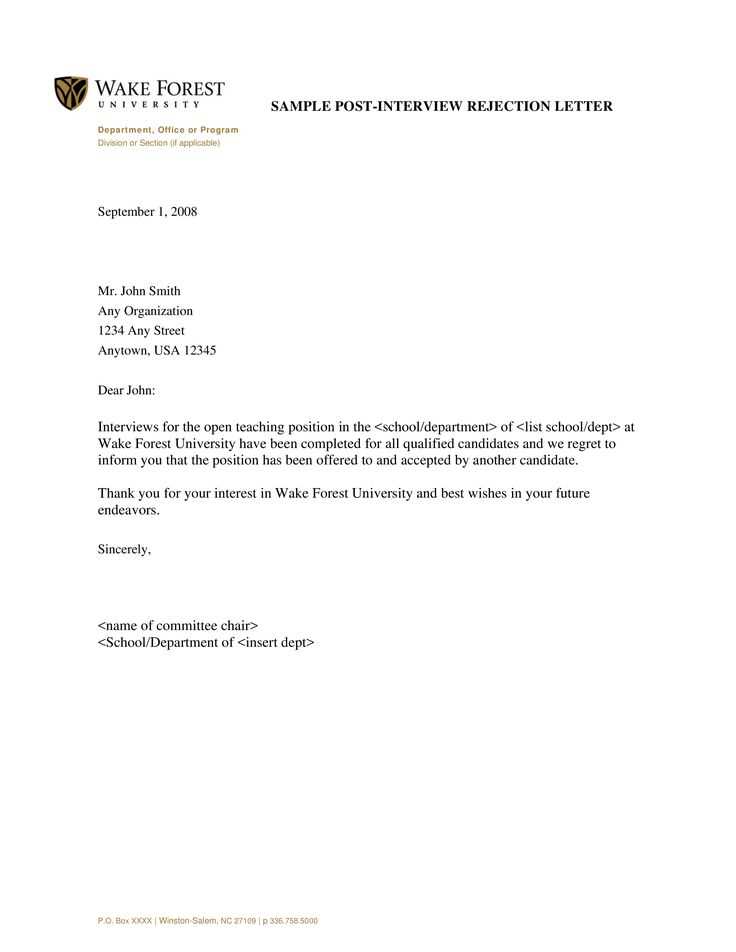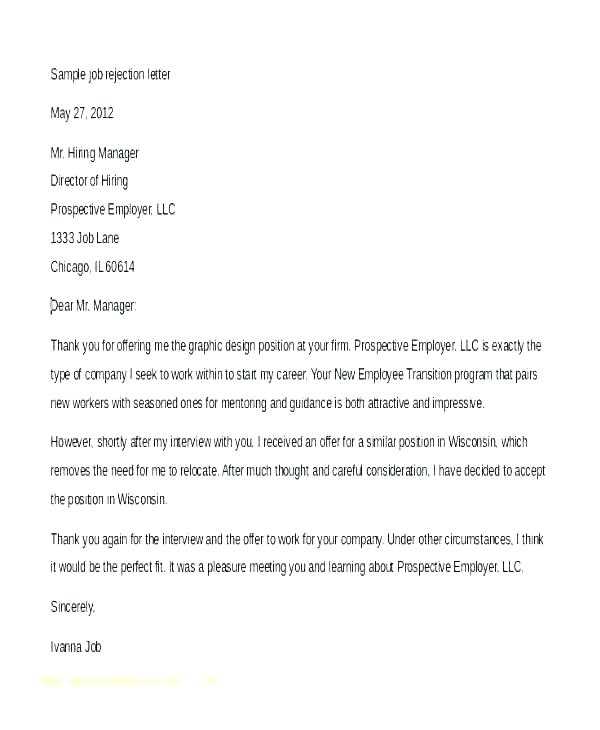Effective Hiring Rejection Letter Template for Employers

When managing the recruitment process, it’s essential to handle all communication with candidates carefully. Informing individuals about your decision, whether they were selected or not, requires a level of professionalism and respect. This type of message is an important part of the employer’s brand, as it reflects the values of your organization.
Crafting a well-structured response can help maintain positive relationships with applicants, even after they’ve been unsuccessful. A thoughtful, considerate message can leave a lasting impression, encouraging them to stay engaged with your company for future opportunities. It also demonstrates your commitment to transparency and fairness throughout the recruitment journey.
In this guide, we’ll explore how to create a clear and empathetic response that balances honesty with respect, ensuring candidates feel valued, regardless of the outcome. By following the best practices, you can make the process smoother for both parties and strengthen your company’s reputation in the competitive job market.
Why You Need a Rejection Message
In any recruitment process, it’s important to acknowledge every candidate’s effort, regardless of the outcome. Sending a response to those who were not selected reflects the professionalism of your company and helps maintain a positive relationship with applicants. While this may seem like a small step, it plays a crucial role in shaping the perception of your brand.
Building Your Employer Brand
Responding respectfully to candidates who are not chosen can significantly enhance your employer brand. A well-crafted message shows that your organization values the time and energy invested by all applicants. This helps ensure that, even if they were not successful this time, candidates might consider applying for future opportunities.
Managing Expectations and Maintaining Professionalism
- Transparency: Clear communication helps avoid misunderstandings and keeps candidates informed about their status.
- Respect: Demonstrating consideration for applicants’ efforts contributes to a positive company image.
- Consistency: Establishing a standard procedure for responses ensures that all candidates are treated fairly.
Sending a timely and professional response also prevents candidates from feeling neglected, which can lead to frustration and negative word-of-mouth. In a competitive job market, how you communicate can influence your company’s ability to attract top talent in the future.
Creating a Clear and Concise Message
When informing applicants about a decision, clarity and brevity are essential. A direct and straightforward response prevents confusion and ensures that your message is well-received. Candidates appreciate knowing where they stand without excessive detail or unnecessary elaboration.
Focus on Key Information
To maintain transparency and avoid ambiguity, make sure your communication includes the most important details, such as:
- The outcome of the application process.
- Appreciation for their time and interest in the position.
- Encouragement to stay connected for future opportunities.
Avoid Overcomplicating the Message
Keep the tone professional, but avoid adding irrelevant information that might detract from the core message. Overloading candidates with excessive feedback or explanations can cause confusion and lead to an unnecessarily lengthy response. A succinct message conveys respect for the candidate’s time while ensuring the key points are clear.
Personalizing Your Response Email
Customizing your communication is key to creating a more meaningful connection with candidates. While a standardized message might be efficient, tailoring your response to each individual can demonstrate thoughtfulness and appreciation. Personalization makes the process feel more human and can leave a positive impression, even when delivering disappointing news.
Including specific details from the applicant’s experience, such as their skills or interview performance, adds a personal touch and shows that you took the time to evaluate their application thoroughly.
| Aspect | Example |
|---|---|
| Opening Line | “Thank you for interviewing with us for the Marketing Manager role. We appreciate the time you spent with us.” |
| Specific Feedback | “Your experience in digital campaigns was impressive, and we enjoyed learning about your strategies.” |
| Future Engagement | “We will keep your resume on file for future openings and encourage you to apply again.” |
By including elements like these, you not only convey your decision clearly but also leave the door open for future opportunities, fostering goodwill and encouraging candidates to stay connected with your company.
Maintaining Professionalism Throughout the Process
It’s crucial to maintain a high level of professionalism in every step of the recruitment journey, especially when communicating the outcome to applicants. How you manage this aspect of the process reflects the values of your company and can significantly impact your reputation in the job market. Even when delivering negative news, a respectful and professional tone ensures that candidates feel valued and treated fairly.
Key Principles of Professional Communication

- Respect: Always acknowledge the effort applicants put into their applications and interviews.
- Clarity: Provide a clear and concise message that leaves no room for misinterpretation.
- Timeliness: Respond in a timely manner to avoid leaving candidates in uncertainty.
How Professionalism Affects Your Brand

By ensuring that your communication is thoughtful and considerate, you help build a strong employer brand. Applicants who feel respected are more likely to speak positively about their experience, even if they were not selected. This can lead to a positive word-of-mouth effect, enhancing your reputation as an organization that values transparency and fairness.
Handling Negative Reactions Gracefully
Not every candidate will respond positively to being informed that they were not selected. It’s important to approach any negative reactions with professionalism and empathy. By addressing such situations calmly and respectfully, you can help diffuse any frustration and maintain a positive atmosphere throughout the process.
Responding to Disappointment
When candidates express disappointment or frustration, it’s crucial to acknowledge their feelings. Show empathy by recognizing their effort and emotions, and avoid becoming defensive. A message that conveys understanding can help them feel heard and respected, even in the face of negative news.
Providing Constructive Feedback
When appropriate, offering constructive feedback can help candidates understand why they weren’t selected and provide valuable insights for their future applications. Keep the feedback focused on specific areas for improvement, but be sure to frame it in a supportive and encouraging manner.
By maintaining a composed and considerate approach, you can turn a potentially negative situation into an opportunity to leave a positive impression, even if the applicant’s experience was less than ideal.
Ensuring a Positive Candidate Experience
Creating a positive experience for all applicants, regardless of the outcome, is a key aspect of effective recruitment. The way you communicate your decision can significantly impact how candidates perceive your organization. Even when delivering disappointing news, treating applicants with respect and professionalism helps preserve your company’s reputation and encourages candidates to stay engaged with your brand.
While it’s important to convey the necessary information clearly, it’s equally important to do so in a way that leaves candidates feeling valued. A thoughtful and well-structured response helps maintain goodwill and demonstrates that you respect the time and effort they’ve invested in the application process.
By ensuring that every applicant, whether successful or not, feels respected and appreciated, you strengthen your employer brand and create an environment where candidates are motivated to apply again in the future. A positive experience can also encourage them to recommend your company to others, further enhancing your reputation in the talent market.